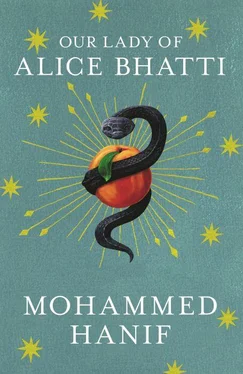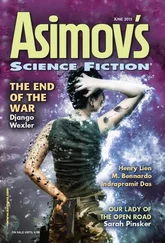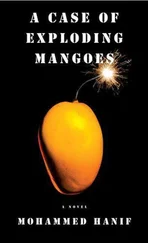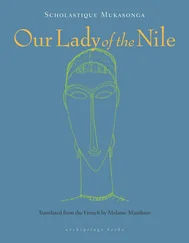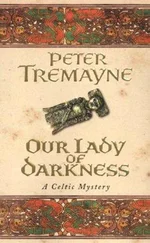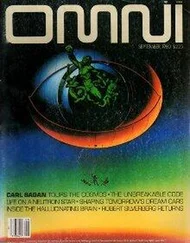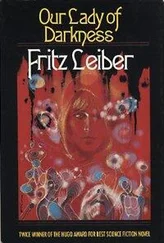And it would seem like a concession. Shouldn’t a baby be a blessing and not some kind of half-baked deal? What kind of life begins with a compromise?
Like her own.
Her stomach settles down after a while and she craves an omelette. She has seen enough pregnant women that these contradictory cravings don’t surprise her. The idea of a baby lolling around on her stomach fills her with a longing that she has never felt before. But the thought of naming that baby, bringing it up in Teddy’s world, fills her with a nameless dread. And then a strange feeling. She tries to suppress it and tells herself that it’s her hormones babbling, but the thought refuses to go away: she feels that she wants the baby but not the baby’s father. And the only way to keep her baby is to get away from the baby’s father.
Maybe she can take Little Yassoo and her own baby and live in the nursing hostel. The rooms there are tiny, though, and rat-infested. Her house in French Colony? Maybe she can get Joseph Bhatti to babysit them while she goes to work. She can see two little babies in Joseph Bhatti’s arms. She forgets for a moment how hard she had tried to escape that place. She feels that if she was in French Colony, she could have given them whatever names she liked.
Baby’s father barges in on the fourth day, when Alice has packed half a bag, made half a plan and counted all her money. The way Teddy goes straight to his cupboard makes it clear to her that he has only come for a change of clothes, not to reclaim his wife or hear the news about his imminent fatherhood. He rummages through the cupboard with such desperation, it seems his life depends on finding the right shirt.
“I have a lead to the target that we lost,” he says, still going through his wardrobe.
“What did you lose?” Alice says, eyeing her half-packed bag.
“We lost a high-value target. We had him and then we lost him. Actually, I lost him,” Teddy says, having found a lifesaving dull green silk shirt that always reminds Alice of the colour of steaming horseshit. He takes off his T-shirt and then sits down to unlace his sneakers. Alice pushes her half-packed bag under the bed with a sneaky shove of her toe. She is surprised at what she has just done. Then she realises it’s not the bag she is trying to hide, but her anger. She doesn’t want to ask him where he has been. How will she raise a child with a man whom she cannot ask a question as simple as that?
“You lost a high-value what? That sounds like a lottery or some kind of gambling. What are your friends up to now? Running gambling dens?”
“A prisoner escaped. A very dangerous man. Actually a boy, but a very dangerous boy. I have to find him or I am buggered. But I have a lead now.” He starts to unbutton his green silk shirt. “I have to meet the superintendent of the police. They might announce some kind of prize for arresting him. Apparently this boy is wanted in three countries. Did anyone tell me that? He said he was just the driver, but now it turns out that he’s a very dangerous driver. And I do believe that he was just a driver. If I don’t find him, I guess I’ll get buggered by three countries.”
It seems Teddy is desperately trying to tell her something. Alice has always known that Teddy never quite tells her what he has been asked to do at work. She wants to understand his situation. He never shares this kind of work information with her, especially when he has choices to make like now: catch a boy or get buggered by three countries. What is this stuff about three countries? Will three countries get together to deal with this lousy husband of hers? About time.
Alice also realises that he seems strangely excited, as if all his work so far has been a preparation for catching this boy.
Teddy disappears into the bathroom carrying his green silk shirt hoisted over a hanger and held high like a flag.
Alice picks up his T-shirt to put it away, and a piece of folded paper falls on the floor. She has never really looked into his pockets or opened his wallet to find clues to where he goes when he’s away. It had never occurred to her that he was capable of hiding anything from her. She unfolds the piece of paper without thinking, then looks up at the closed bathroom door and waits to hear the sound of the shower. It’s a pencil drawing of a boy’s face, broad forehead, tiny sunken eyes, sparse beard on his pointy chin. It could be any boy in his age group, even Teddy if he was unshaven.
The face that stares back at her from the paper makes her anxious for the future of her own baby.
She begins to worry about Teddy. She begins to worry about herself. She realises that she hasn’t thought about the logistics of raising a baby. Who will take care of the baby when she is at work? Certainly not her father, she has decided. She can send her to a nursery, but where will the money come from? She will drop her at school, and she can imagine herself walking a little girl in a blue school uniform, hugging her goodbye at the gates of St Xavier. But who will pick her up from school? She wouldn’t want to take her baby girl to the Sacred. Noor could probably play with her or keep her busy, but the Sacred is full of all kinds of infections and diseases and ambulance sirens. The Sacred is no place for a baby to hang out. She resolves that maybe she should tell Teddy and see how he responds. Men change when they have babies. Her own father, Joseph Bhatti, hasn’t been an ideal dad, a bit crazy at times, but he held down a job till the age of sixty-five, and even after retiring he kept doing whatever freelance work he could get. She looks at the sketch again, shudders, then folds it and puts it in the shirt’s pocket. You are going to become a father: she whispers these words to herself. They seem fake to her, words remembered from a TV soap perhaps. Is this how people tell their partners when they find out they have been knocked up?
She is still struggling to find the right words when the WC in the bathroom flushes twice and Teddy comes out rubbing his face with a towel. “I need some money. And if somebody comes asking for me, tell them that I haven’t been back, that you haven’t seen me since I left with the G Squad.”
Alice Bhatti starts rummaging through her handbag and counting her money again.
“How are you going to find the boy? There are millions of boys in this city. Let the police find him. It’s their job.”
Teddy, who is carefully adjusting the crease on his trousers, turns his head and stares at her steadily. “You don’t look yourself. What’s the matter? I ask you for some money and you start giving me advice about how to run my life?”
The decision is made for Alice as she looks at his cocked eyebrow, the utter incomprehension in his eyes. Then he makes it easier for her. “I think you should go to your father’s for a few days. I don’t think you can handle the pressure. I’ll come and get you when this is over.”
“How much money do you need?” Alice asks without looking up.
Alice Bhatti has learnt within one week that making miracles is hard work, as hard as being an underpaid junior nurse in an understaffed welfare hospital. She has brought all her clothes in a bag and is camping out at the hospital. She is living the life of an in-house messiah at the Sacred. Dr Pereira tries his best to deflect the rumours about miraculous cures in the hospital by putting up banners announcing a cleanliness week. When someone calls up to find out about the sudden plunge in the infant mortality rate in the maternity ward, he recounts the steps he has taken to improve the standards of hygiene and points to the banner announcing the cleanliness campaign.
Dr Pereira has never figured out how people find out about these things. Somebody whispers something in your ear, and before you can turn to them and ask how they know in the first place, the rumour has travelled around the city and somebody else is whispering a version of the original in your other ear. Here it was a sweeper who had been instructed by Sister Hina Alvi to make arrangements for the born dead on Bed 8. There is generally no rush with the dead babies, so the sweeper takes his cigarette break, goes to the storeroom, and on his way stops and talks to Noor about the comparative merits of various brands of powdered milk. By the time he returns with a white sheet and a small bar of soap, he sees that the baby’s feet are pedalling in the air and he is making a ruckus, as if trying to convince everyone that they have made a mistake. And then the sweeper sees that Sister Alice Bhatti is kneeling on the floor surrounded by bloodied cotton and piles of gauze. Her hands are folded in front of her chest and she is praying. The sweeper thinks he has no option but to go down on his knees and join her in prayer. He is not sure what exactly has happened; Hina Alvi declared a baby dead when the baby is all here, very much alive, crying his lungs out. The sweeper will tell everyone that he felt the presence of the Holy Spirit. In reality he reached that conclusion by using logic. When he is down on his knees, he realises that the dead baby come alive is a miracle, but there is this other person who has made the miracle possible. The sweeper has seen many odd things in this place: he has seen quintuplets being born, he has seen two doctors having a punch-up in the operating theatre over who forgot to take out a pair of scissors before stitching up the patient, but he has never felt any holy presence, only human negligence. Sister Alice kneeling in a puddle of blood, muttering a long prayer in Latin that the sweeper remembers faintly hearing in his childhood, is the presence . She exudes warmth, she is oblivious to her surroundings, the crying baby, the blood on the floor. The delivery room’s fluorescent light seems to bathe her in a holy glow.
Читать дальше
